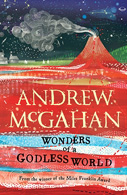 |
Andrew McGahan is best known for his Miles Franklin Award-winning novel The White Earth, and for Praise, which won the author the "Australian"/Vogel Award in 1991. His latest novel, Wonders of a Godless World, has just been released and you can see a promotional trailer for the book here. From the publisher's page: "The witch, the virgin, the archangel, the duke and an orphan meet in the extraordinary new novel from the award-winning Andrew McGahan -- an electrifying, tumultuous story of inner demons, desire and devastation, a powerful and apocalyptic tale that sweeps the reader from the beginning of time to the end of the earth." |
Leading up the release of the book, Jo Case interviewed the author for the "Readings" weblog.
Wonders of a Godless World is heavily reminiscent of myth or fairytale: its population of archetypes, the element of parable, the magic realist or fantastical element. What drew you to using this form? Was it your intention to create a kind of contemporary fable?
Actually, my intention at the very beginning was just to find some way to indulge my schoolboy fascination for unusual natural disasters. Originally, I was trying to come up with a story that involved no human characters at all, instead using only the forces of nature interacting in a kind of wordless planetary drama. I couldn't make that idea work, but then the orphan and the foreigner emerged. The orphan -- a girl freakishly in tune with the planet and its processes, but so out of tune with humanity that she can't talk or even remember her own name. And the foreigner -- a man utterly out of tune with the planet and doomed time and time again to die in natural disasters, and yet whose own outrage always brings him back to life. From there, all the weird and interesting stuff about Earth that I originally wanted to explore could be played out in the relationship between these two.
But having allowed humans into the picture, I was still keen to keep them at a distance. Hence no one is allowed a name or any normal dialogue or even, when it comes to the five or six peripheral characters, much individual personality. So yes, because of that the story takes on an otherworldly or mythic or fairytale tone, and I was happy to go along with it, but it was more of a side-effect than a central purpose.
